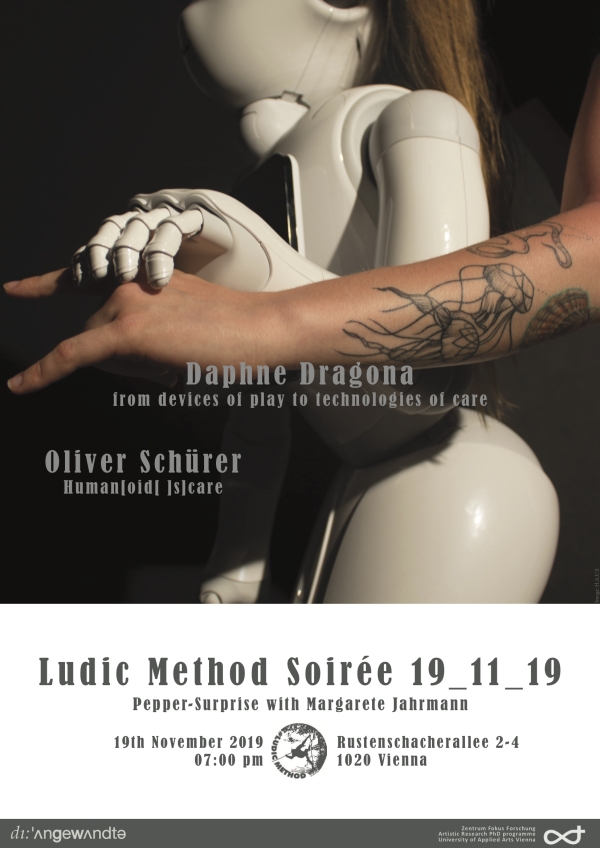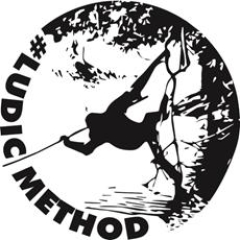Ludic Method Soirée: Daphne Dragona / Oliver Schürer
[S]care Wolves
- a social play performance with the humanoid care robot "pepper"
The theory and practice of artistic research are concerned
with specific ways to approach art, science and epistemic things. Their goals are sometimes written fictitiously, presented
in playful formats and made public in processes of exchange. The methods of artistic research comprise – in a structural coupling
– contradictions, a joyful science and an associative memory play. Ludic agency is caused by ongoing psychophysical
soirées — the next taking place on 19th November, 7 pm. Ludic Method is presented in a coupling of public lectures and performative
play.We embrace gaya sciencia and cognitive settings.
Ludic Method Soirées. Activist research practice lecture
series in playful formats.
Hosted by Prof. Margarete Jahrmann, artistic PhD program, University of Applied Arts Vienna
Daphne Dragona is a curator and writer based in Berlin. Through her work, she focuses
on artistic practices, methodologies and pedagogies that challenge contemporary forms of power. Among her topics of interest
are: the controversies of connectivity, the promises of the commons, the challenges of artistic subversion, the instrumentalization
of play, the problematics of care and empathy, and the potential of kin-making technologies in the time of climate crisis.
Her exhibitions have been hosted at the National Museum of Contemporary Art (Athens), Aksioma (Ljubljana), Onassis Stegi (Athens),
Le Lieu Unique (Nantes), Goethe Institut Athen, and Laboral (Gijon). Articles of hers have been published by Springer, Springerin,
Sternberg Press, Meson Press and Leonardo Electronic Almanac, while talks of hers have been hosted at Mapping Festival (Geneva),
MoMa (New York), Hek (Basel), Arts in Society (London), Leuphana University (Lueneburg) and Goethe University (Frankfurt).
Dragona was the conference curator of transmediale from 2015 until 2019. She holds a PhD from the Department of Communicaton
and Media Studies of the University of Athens.
From devices of play to technologies of care
How much do we know about or reflect upon automated care? What happens when cute robots, artificial human companions and
intelligent assistants of all kinds become part of our everyday life? Playful and tireless, such machines can continuously
learn from us and respond to our desires and needs. Providing services of a machinic and affective character, they come in
perfect accordance with the neoliberal call for optimisation and self-care.They challenge the relationships between humans
and machines, and they are introduced as affective infrastructures that can assist on an individual and societal level. The
talk will address the challenges of the emerging technologies of care, bringing into the discussion artistic responses and
critical perspectives. Special attention will be payed to the instrumentalisation and commodification of care but also play,
with references to works and topics that were discussed in the framework of transmediale festival 2019, the exhibition Tomorrows
(Le Lieu Unique 2019), and the Engineering Care Web Residencies by Solitude & ZKM.
Oliver Schürer
is a researcher, curator, editor and author as well as Senior Scientist and Deputy Director at the Institute for Architecture
Theory and Philosophy of Technology at the Vienna University of Technology. Since 2009 he is developing architecture theory
as well as theory of technics by means of techno-aesthetic experiments. In 2014 he founded the transdisciplinary research
group H.A.U.S. (Humanoids in Architecture and Urban Spaces). Researchers from the domains of architecture, automation technology,
HRI, computer science, AI research, music, media arts, dance, psychology and philosophy research on aspects of social robotics
and social AI in lifeworlds. h-a-u-s.org
Human[oid[ ]s]care
The topic is articulated twice
in this short lecture: as robot dance performances and as human-robot interaction experiments. In the dance performances,
intimacy and power relations with autonomous machines are brought to the spectators experience as well as discussed aesthetically.
In the experiments, Wittgenstein's philosophical language-game is getting spatialized, together by both, a humanoid robot
and a person. By means of verbal and non-verbal communication they initiate the constitution of a model of space in an artificial
intelligence system. This so called architecture-space-game emerges a cultural-spatial-model, meant to be harnessed for the
empowerment of vulnerable persons in care.
Zentrum Fokus Forschung dieAngewandte Vienna
19.11.2019
19 Uhr
Rustenschacherallee 2-4
1020 Wien





